Page 1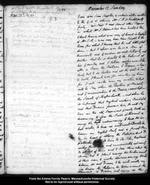
NOVEMBER 17. SUNDAY
[This entry is a continuation of the last entry in John Adams diary 35.] Have you seen says he, a certain Letter written to the
C. de V. wherein
Mr. S.A. is treated pretty freely. -- Yes says I and several other Papers in which
Mr. J. Adams has been treated so too. I dont know, what you may of heard in England of
Mr. S.A. You may have been taught to believe, for what I know, that he eats little Children. But I assure you he is a Man of Humanity and
Candour as well
[as] Integrity, and further that he is devoted to the Interest of his Country and I believe wishes never to be, after a Peace, the Partisan to France or England, but to do justice and all the good he can to both. I thank you for mentioning him for I will make him my orator. What will he say, when the Question of Amnesty and Compensation to the Tories, comes before the Senate of Massachusetts. And when he is informed that England makes a Point of it and that France
favours her. He will say here are two old, sagacious Courts,
eachboth endeavouring to sow the Seeds of Discord among Us, each endeavouring to keep Us in hot Water, to keep up continual Broils between an English Party and a french Party, in hopes of obliging the Independent and patriotic Party, to lean to its Side. England wishes them here and compensated, not merely to get rid of them and to save
them selves the Money, but to plant among Us Instruments of their own, to make divisions among Us and between Us and France, to be continually crying down the Religion, the Government, the Manners of France, and crying up the
Page 2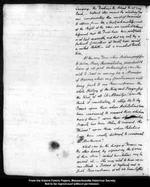
Language, the Fashions, the Blood &c. of England. England also means by insisting on our compensating these worst of
Ennemies to obtain from Us, a tacit Acknowledgment of the Right of the War -- an implicit Acknowledgment, that the Tories have been justifiable or at least excuseable, and that We, only by a fortunate Coincidence of Events, have carried a wicked Rebellion into a
compleat Revolution.
At the very Time when Britain professes to desire Peace, Reconciliation, perpetual Oblivion of all past Unkindnesses, can She wish to send in among Us, a Number of Persons, whose very Countenances will bring fresh to our Remembrance the whole History of the Rise, and Progress of the War, and of all its Atrocitys? Can she think it conciliatory, to oblige Us, to lay Taxes upon those whose Habitations have been consumed, to reward those who have burn'd them? upon those [illegible] whose Property has been stolen, to reward the Thieves? upon those whose Relations have been cruelly destroyed, to compensate the Murtherers?
What can be the design of France on the other hand, by espousing the Cause of these Men? Indeed her Motives may be guessed at. She may wish to keep up in our Minds a Terror of England, and a fresh Remembrance of all We have suffered.
Page 3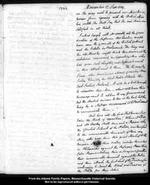
Or She may wish to prevent our Ministers in Europe from agreeing with the British Ministers,
untill She shall say that She and Spain are
satisfyed in all Points.
I entered largely with Mr. Oswald, into the Consideration of the Influence this Question would have upon the Councils of the British Cabinet and the Debates in Parliament. The King and the old Ministry might think their personal Reputations concerned, in supporting Men who had gone such Lengths, and suffered so much in their Attachment to them. -- The K. may say I have other dominions abroad, Canada, Nova Scotia, Florida, the West India Islands, the East Indies, Ireland. It will be a bad Example to abandon these Men. Others will loose their Encouragement to adhere to my Government. But the shortest Answer to this is the best, let the King by a Message recommend it to Parliament to compensate them.
But how will My Lord Shelburne sustain the shock of Opposition? When Mr. Fox and Mr. Burke shall demand a Reason why the Essential Interests of the Nation, are sacrificed to the unreasonable demands of those very Men, who have done this great Mischief to the Empire. Should these Orators indulge themselves in Philippicks against the Refugees, shew their false Representations, their outragious Cruelties, their innumerable demerits against the Nation, and then attack the first Lord of the Treasury for continuing to spend the Blood and Treasure of the Nation for their Sakes.
Page 4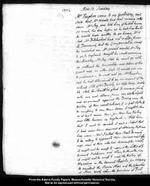
Mr. Vaughan came to me Yesterday, and said that
Mr. Oswald had that morning called upon
Mr. Jay, and told him, if he had known as much the day before as he had since learned, he would have written to go home. Mr. V. said Mr. Fitzherbert had received a Letter from Ld. Townsend, that the Compensation would be insisted on.
Mr. Oswald wanted
Mr. Jay to go to England. Thought he could convince the Ministry.
Mr. Jay said he must go, with or without the Knowledge and Advice of this Court, and in either Case it would give rise to jealousies. He could not go. Mr. Vaughan said he had determined to go, on Account of the critical State of his Family, his Wife being probably abed. He should be glad to converse freely with me, and obtain from me, all the Lights and arguments against the Tories, even the History of their worst Actions, that in Case it should be necessary to run them down it might be done or at least expose them, for their true History was little known in England. -- I told him that I must be excused. It was a Subject that I had never been desirous of obtaining Information upon. That I pitied those People too much to be willing to aggravate their Sorrows and Sufferings, even of those who had deserved the Worst. It might not be amiss to reprint the Letters of G.
[Govenor] Bernard,Hutchinson and Oliver, to
shew the rise. It might not be amiss to read the History of Wyoming in the Annual Register for 1778 or 9, to recollect the Prison Ships, and the Churches at New York, where the Garrisons of Fort
Page 5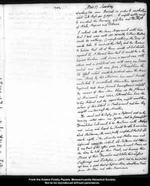
Washington were starved in order to make them
inlist into Refugee Corps. It might not be amiss to recollect the Burning of Cities, and The Thefts of Plate, Negroes and Tobacco.
I entered into the same Arguments with him that I had used with Mr. Oswald, to shew that We could do nothing, Congress nothing. The Time it would take to consult the States, and the Reasons to believe that all of them would at last decide against it. I shewed him that it would be a Religious Question with some, a moral one with others, and a political one with more, an Economical one with very few. I shewed him the ill Effect which would be produced upon the American Mind, by this Measure, how much it would contribute to perpetuate Alienation against England, and how french Emmissaries might by means of these Men blow up the flames of Animosity and War. I shewed him how the Whig Interest and the Opposition might avail themselves of this Subject in Parliament, and how they might embarrass the Minister.
He went out to Passy, for a Passport, and in the Evening called upon me again. Said he found Dr. Franklins Sentiments to be the same with Mr. Jays and mine, and hoped he should be able to convince Lord Shelburne. He was pretty confident that it would work right. -- The Ministry and Nation were not informed upon the Subject. Ld. Shelburne had told him that no Part of his office gave him so much Paine as the Levy he held for these People, and hearing their Stories of their Families and Estates, their Losses, Sufferings and Distresses. Mr. V. said he had picked up here, a good deal of Information, about those People, from Mr. Allen and other Americans.
Page 6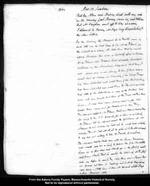
Ridley, Allen and Mason, dined with me, and in the Evening Capt. Barney came in, and told me that Mr. Vaughan went off to day at noon. I delivered to Barney, Mr. Jays long Dispatches, and the other Letters.
In the Evening the Marquis de la Fayette came in and told me, he had been to see Mr. de Fleuri, on the Subject of a Loan. He told him that he must afford America this Year a Subsidy of 20 millions. Mr. de Fleuri said France had already spent 250 millions in the American War, and that they could not allow any more Money to her. That there was a great deal of Money in America. That the Kings Troops had been subsisted and paid there. That the British Army had been subsisted and paid there, &c.The Marquis said that little of the Subsistance or pay of the British had gone into any hands but those of the Tories within their Lines. I said that more Money went in for their Goods than came out for Provisions or any Thing. The Marquis added to Mr. Fleury that Mr. Adams had a Plan for going to the States General, for a Loan or a Subsidy. Mr. Fleury said he did not want the Assistance of Mr. Adams to get Money in Holland, he could have what he would. The M. said Mr. A. would be glad of it. He did not want to go, but was willing to take the Trouble, if necessary.
The Marquis said he should dine with the Queen tomorrow and would give her a hint, to favour Us. That he should take Leave in a few days and should go in the fleet that was to sail from Brest. That he wanted the Advice of Mr. F., Mr. J. and me before he went, &c. Said there was a Report that Mr. Gerard had been in England, and that Mr. de Rayneval was gone. I told him I saw Mr. Gerard at Mr. Jays a few Evenings ago.
Page 7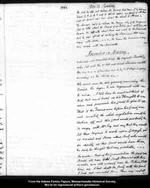
He said he did not believe Mr. Gerard had been. That he had mentioned it to C. de V. and he did not appear confused at all, but said Mr. Gerard was here about the Limits of Alsace.
The Marquis said that he believed, the Reason why C. de Vergennes said so little about the Progress of Mr. Fitsherbert with him, was because the difficulty about Peace was made by the Spaniards and he was afraid of making the Americans still more angry with Spain . . . . He knew the American [were ]very angry with the Spaniards.
NOVEMBER 18 MONDAY.
Returned Mr. Oswalds Visit. He says Mr. Strachey who sat out the 5 did not reach London untill the 10 . . . . Couriers are 3, 4, or 5 days in going according as the Winds are.
We went over the old ground, concerning the Tories. He began to use Arguments with me to relax. I told him he must not think of that, but must bend all his Thoughts to convince and perswade his Court to give it up. That if the Terms now before his Court, were not accepted, the whole negotiation would be broken off, and this Court would probably be so angry with Mr. Jay and me, that they would set their Engines to work upon Congress, get us recalled and some others sent, who would do exactly as this Court would have them. He said, he thought that very probable....
In another Part of his Conversation He said We should all have Gold Snuff Boxes set with Diamonds. You will certainly have the Picture. I told him
no. I had dealt too freely with this Court. I had not concealed from them any
usefull
Page 8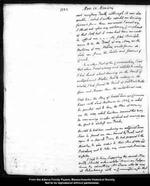
and necessary Truth, although it was
disagreable. Indeed I neither expected nor desired any
favours from them nor would I accept any. I should not refuse any customary Compliment of that Sort, but it never had been nor would be offered me.... My fixed Principle never to be the Tool, of any Man, nor the Partisan of any Nation, would forever exclude me from the Smiles and
favours of Courts.
In another Part of the Conversation, I said that when I was young and addicted to reading I had heard about dancing on the Points of metaphisical Needles. But by mixing in the World, I had found the Points of political Needles finer and sharper than the metaphisical ones.
I told him the Story of Josiah Quincys Conversations with Lord Shelburne in 1774, in which he pointed out to him, the Plan of carrying on the War, which has been pursued this Year, by remaining inactive at Land and cruising upon the Coast to distress our Trade.
He said he had been contriving an artificial Truce since he found we were bound by Treaty not to agree to a separate Truce. He had proposed to the Ministry, to give Orders to their Men of War and Privateers, not to take any unarmed American Vessells.
I said to him, supposing the armed Neutrality should acknowledge American Independence, by admitting Mr. Dana who is now at
Petersbourg with a Commission for that
Page 9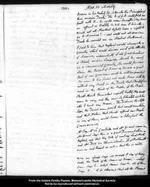
Purpose in his Pocket, to subscribe the Principles of their marine Treaty? The K. of G.B. could find no fault with it. He could never hereafter say, it was an Affront or Hostility. He had done it himself. Would not all
Newtral Vessells have a right to go to America? -- and could not all American Trade be carried on in Neutral Bottoms.
I said to him that England would always be a Country which would deserve much of the Attention of America, independently of all Considerations of Blood, Origin, Language, Morals &c. Merely as a commercial Country, She would forever claim the Respect of America, because a great Part of our Commerce would be with her provided She came to her Senses and made Peace with Us without any Points in the Treaty that should ferment in the Minds of the People. If the People should think themselves unjustly treated, they would never be easy, and they were so situated as to be able to hurt any Power. The Fisheries, the Mississippi, the Tories were points that would rankle. And that Nation that should offend our People in any of them, would sooner or later feel the Consequences.
Mr. Jay, Mr. Le Couteulx and Mr. Grand came in. Mr. Grand says there is a great Fermentation in England, and that they talk of uniting Lord North and Mr. Fox in Administration. D. of Portland to come in and Keppel go out. But this is wild.
You are afraid says
Mr. Oswald to day of being made the Tools of the Powers of Europe. -- Indeed I am says I. -- What Powers says he. All of them says I. It is obvious that all the Powers
Page 10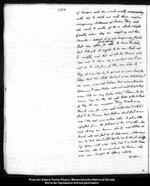
of Europe will be continually
maneuvring with Us, to work us into their real or imaginary
Ballances of Power. They will all wish to make of Us a Make Weight Candle, when they are weighing out their Pounds. Indeed it is not
surprizing for We shall very often
if not always be able to turn the Scale. But I think it ought to be our Rule not to meddle, and that of all the Powers of Europe not to desire Us, or perhaps even to permit Us to interfere, if they can help it.
I beg of you, says he, to get out of your head the Idea that We shall disturb you. -- What says I do you yourself believe that your Ministers, Governors and even Nation will not wish to get Us of your Side in any future War? -- Damn the Governors says he. No. We will take off their Heads if they do an improper thing towards you.
Thank you for your good Will says I, which I feel to be sincere. But Nations dont feel as you and I do, and your nation when it gets a little refreshed from the fatigues of the War, when Men and Money are become plenty and Allies at hand, will not feel as it does now. We never can be such damned Sots says he as to think of differing again with you. -- Why says I, in truth I have never been able to comprehend the Reason why you ever thought of differing with Us.
Page 11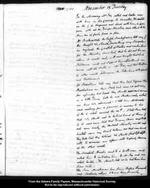
1782 NOVEMBER 19 TUESDAY.
In the Morning Mr. Jay called and took me with him in his Carriage to Versailles. We waited on the C. de Vergennes and dined with him, in Company with all the Foreign Ministers, and others to the Number of forty four or five.
Mr. Berkenrode the Dutch Ambassador, told me, that he thought We should see something very singular in England. The Conflicts of Parties and contentions for the Ministry were such, that he did not know where it would end. It was thought that Lord Shelburne could not support himself without an Union with Ld. North or Mr. Fox, and that the Choice of either would determine the Intentions of the Court and Parliament.
Mr. Brantzen told me, that they had begun the Negotiations on their Part, but were as yet very far asunder, but hoped they should approach nearer in a little Time. Both he and Berkenrode asked me how We advanced? I told him Mr. Oswald was waiting for a Courier, in answer to his of the 5. which arrived the 10th. I told them both that We should not be behind hand of them. That if it was once said that France, Spain and Holland were ready, the British Ministry would not hesitate upon any Points between Us that remained. They both said they believed We should find less difficulty to arrange our affairs with England, than any of the others would.
The Sweedish Minister went to a Gentleman and asked him to introduce him to Mr. Jay and me which he did. The Minister told us he had been here since 1766.
The same Ministers are here from Russia, Denmark and Sardinia, whom I knew here, formerly.
Page 12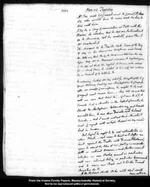
Mr. Jay made his Compliment to Count D'Aranda, who invited him to come and see him and dine with him.
I see, by a long Conversation at Table with the Baron de Linden, that he has an Inclination to go to America, Yet he modestly gives Place to Mr. Vanberckel.
The Marquis de la Fayette took leave of the King to day in his American Uniform and Sword. He told me, that the C. de Vergennes told him the day before that, Mr. de Rayneval was gone to England again. That he did not think the English so sincere, as he wished, for a speedy Peace. He wished it himself, but could not see a Prospect of it, suddenly, &c.
In returning I asked Mr. Jay what he thought of the K. of Great Britains sending an Ambassador to Congress. After Mr. Oswalds Commission, he might do it, and Congress must receive him. -- Jay said do you think with me upon that Point too? If I were the K. of G.B. I would send a Minister in the highest Character, he should be Ambassador Extraordinary, and I would accredit him, to our dear and beloved Friends. And I would instruct that Minister to treat Congress with as high Respect as any crowned head in Europe.
But says I, he ought to be well instructed too in other Points -- vizt. never to hint or to suffer an hint against the Treaties with France and Holland, never to admit the Idea of our failing in our public faith or national Honour -- and farther never to interfere in our Parties, general or particular, with our internal Policy, or particular Governments, and to warn our People not to let the French Ministers do it.
If the Britons should strike with Us, I would agree with you
Page 13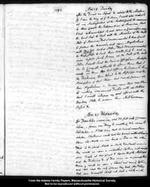
after the terms are signed to advise to the Measure. If I were the King of G. Britain, I would give Orders to all my Ambassadors at the Neutral Courts, to announce to those Courts the Independence of America, that I had acknowledged it, and given a Commission under the Great Seal to treat with the Ministers of the United States of America. That I recommended to these Courts to follow the Example, and open Negotiations with the said United States. That I recommended to those
neutralStates to send their
Vessells freely to and receive
Vessells freely from, all the Ports of the United States. I would send the Earl of Effingham Ambassador to Congress, instructed to assure them that I would
nodo them my best Offices, to secure to them the Fisheries, their Extent to the Missisippi and the Navigation of that River. That I would
favour all their Negotiations in Europe, upon their own Plan of making commercial Treaties with all Nations. That I would interpose my good offices with the Barbary States, to procure them Mediterranean Passes, &c.
NOV. 20 WEDNESDAY.
Dr. Franklin came in, and We fell into Conversation. From one Thing to another, We came to
Politicks. I told him, that it seemed uncertain whether Shelburne could hold his Ground without leaning Upon Ld. North on one hand or Fox on the other. That if he joined North, or North & Co. should come in, they would go upon a contracted System, and would join People at this Court to deprive Us of the
Missisippi and the Fisheries &c. If Fox came in or joined Shelburne they would go upon a liberal and manly System, and this was the only Choice they had. No Nation had ever brought itself into such a Labyrinth
Page 14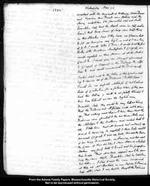
perplexed with the demands of Holland, Spain, France and America. Their Funds were failing and the Money undertaken to be furnished was not found.
Franklin said, that the Bank came in Aid, and he learned that large Sums of Scrip were lodged there. -- In this Situation says I they have no Chance but to set up America very high -- and if I were King of G.B. I would take that Tone. I would send the first Duke of the Kingdom Ambassador to Congress, and would negotiate in their
favour at all the Neutral Courts &c. I would give the strongest Assurances to Congress of Support in the Fisheries, the
Missisippi &c. and would compensate the Tories myself.
I asked what could be the Policy of this Court in wishing to deprive Us of the Fisheries? and Missisippi? I could see no possible Motive for it, but to plant Seeds of Contention for a future War. If they pursued this Policy they would be as fatally blinded to their true Interests as ever the English were.
Franklin said, they would be every bit as blind. That the Fisheries and
Missisippi could not be given up. That nothing was clearer to him than that the Fisheries were essential to the northern States, and the
Missisippi to the Southern and indeed both to all. I told him that Mr. Gerard had certainly appeared to America, to negotiate to these Ends, vizt. to
perswade Congress to give up both. This was the Reason of his being so unpopular in America, and this was the Cause of their dislike to
Sam Adams, who had spoken very freely both to Gerard and his Congress on these heads. That Marbois appeared now to be pursuing the same Objects.
Franklin said he had seen his Letter. I said I was the more
surprized at this, as Mr. Marbois, on our Passage to America, had often said to me, that he thought the Fisheries
Page 15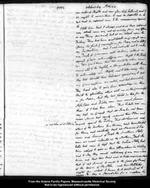
our natural Right and our essential Interest, and that We ought to maintain it and be supported in it. Yet that he appeared now to be
maneuvring against it.
I told him that I always considered their extraordinary Attack upon me, not as arising from any Offence or any Thing personal, but as an Attack upon the Fishery. There had been great debates in Congress upon issuing the first Commission for Peace, and in Setting my Instructions -- that I was instructed not to make any Treaty of Commerce with Britain, without an express Clause acknowledging our Right to the Fishery. This Court knew that this would be, when communicated to the English, a strong Motive with them to acknowledge our Right, and to take away this they had directed their Intrigues against me, to get my Commission annulled, and had succeeded. They hoped also to gain some Advantage in these Points by associating others with me in the Commission for Peace. But they had failed in this for the
Missisippi and Fishery were now much securer than if I had been alone. That Debates had run very high in Congress. That Mr. Drayton and
Governieur Morris had openly espoused their Plan and
A mistake as Mr J. [Jay] tells me. argued against the Fishery. That Mr. Laurens and others of the Southern Gentlemen, had been staunch for them, and contended that as Nurseries of Seamen and Sources of Trade the Southern States were as much interested as the Northern. That Debates had run so high that the Eastern States had been obliged to give in their Ultimatum in Writing and to say they would withdraw, if any more was done, and that this Point was so tender and important that if not secured it would be the Cause of a Breach of the Union of the States -- and their
Politicks might for what I knew be so profound as to mean to lay a foundation for a rupture
Page 16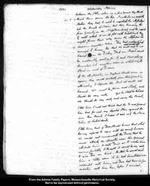
between the States, when in a few Years they should think them grown too big. I could see no possible Motive they had, to wish to negotiate the
Missisippi into the Hands of Spain, but this. Knowing the fine Country in the
Neighbourhood, and the rapidity with which it would fill with Inhabitants, they might force their Way down the
Missisipi and occasion another War. They had certainly Sense enough to know too that We could not
and would not be restrained from the Fishery. That our People would be constantly pushing for it, and thus plunge themselves into another War, in which We should stand in need of France.
If the old Ministry in England should come in again, they would probably join this Court in attempting to deprive Us. But all would not succeed. We must be firm and steady, and should do very well. -- Yes he said he believed We should do very well, and carry the Points.
I told him I could not think that the K. and Council here had formed any digested Plan against Us upon these Points. I hoped it was only the Speculation of Individuals.
I told him, that if Fox should know that Shelburne refused to agree with Us merely because We would not compensate the Tories, that he would attack the Minister upon this Ground and pelt him so with Tories as to make him uncomfortable. I thought it would be very well to give Fox an hint. -- He said he would write him a Letter upon it. He had sometimes corresponded with him, and Fox had been in Conversation with him here, before I arrived.
Page 17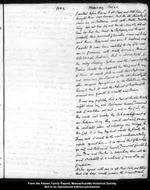
I walked before Dinner to Mr. Jays, and told him, I thought there was danger, that the old Ministry would come in, or Shelburne unite with North. That the King did not love Us, and the old Ministry did not love Us: but they loved the Refugees, and thought probably their personal Characters concerned to support them. Rayneval was gone to England, and I wanted to have him watched to see, if he was ever in Company with North, Germain,Stormont,Hillsborough,Sandwich, Bute or Mansfield. If the wing clipping System and the Support of the Tories should be suggested by this Court to any of them it would fall in with their Passions and Opinions, for several of the old Ministry, had often dropped Expressions in the Debates in Parliament, that it was the Interest of England to prevent our Growth to Wealth and Power.
It was very possible, that a Part of the old Ministry might come in, and Richmond, Keppel,Townsend and Cambden go out, and in this Case,tho they could not revoke the Acknowledgment of our Independence, they would certainly go upon the contracted plan of clypping our Wings. In this Case it is true, England would be finally the Dupe, and it would be the most malicious Policy possible against her. It is agreed that if the Whigs go out, and Richmond, Keppell,Townsend, Cambden &c. join Fox and Burke in Opposition, there will be great Probability of a national Commotion and Confusion.
Mr. Jay agreed with me, in all I had said, and Added that six days would produce the Kings Speech.
Page 18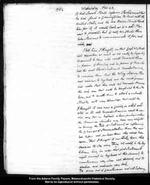
If that Speech should inform Parliament that he had issued a Commission to treat with the United States, and the two Houses should thank him for it, it would look as if a good Plan was to prevail: but if not, We should then take Measures to communicate it far, and wide.
and
I told him I thought, in that Case We should aid Opposition as much as We could, by suggesting Arguments, to those who would transmit them in favour of America, and in favour of those who had the most liberal Sentiments towards America, to convince them that the Wing clipping Plan was ruinous to England, and the most generous and noble Part they could Act towards America, the only one that could be beneficial to the Nation, and to enable them to attack a contracted Ministry with every Advantage, that could be.
I thought it was now a Crisis, in which good Will or Ill will towards America would be carried very far in England, a time perhaps when the American Ministers may have more Weight in turning the Tide of Sentiment, or influencing the Changes of Administration than they ever had before and perhaps than they would have again. That I thought it our Duty, Upon this Occasion to say every Thing We could, to the Englishmen here, in order that just Sentiments might prevail in England at this Moment, to countenance every Man well disposed, and to disabuse and undeceive every body.
To drive out of Countenance and into Infamy,
Page 19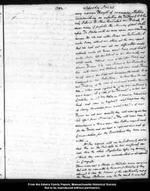
every narrow Thought of cramping, stinting, impoverishing or enfeebling Us. To
shew that it is their only Interest to
shew themselves our Friends, to wear away, if possible, the Memory of past Unkindnesses. To strike with Us now upon our own Terms, because
tho We had neither Power nor Inclination to make Peace, without our Allies, yet the very report that We had got over all our difficulties would naturally make all Europe expect Peace, would tend to make Spain less exorbitant in her demands, and would make Holland more ardent for Peace, and dispose France to be more serious in her Importunities with Spain and Holland, and even render France herself easier,
tho I did not imagine she would be extravagant in her Pretentions. To
shew them the ruinous Tendency of the War if continued another Year or two. -- Where would England be if the War continued 2 Years longer? What the State of her Finances? What her Condition in the E. and W. Indies, in N. America, Ireland, Scotland and even in England? What hopes have they of saving themselves from a civil War? If our Terms are not now accepted, they will never again have such offers from America. They will never have so advantageous a Line -- never their Debts -- never so much for the Tories, and perhaps a rigorous demand of Compensation for the Devastations they have committed.
Mr. Jay agreed with me in Sentiment, and indeed they are the Principles he has uniformly pursued thro the whole Negotiation before my Arrival. I think they cannot be misunderstood or disapproved in Congress.
There never was a Blunder in
Politicks more egregious than will be committed by the present Ministry, if they attempt to save the
Honour of the old Ministry and of the Tories.Shelburne may be too weak to combat
Page 20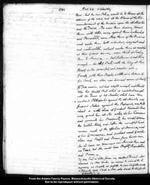
them: but the true Policy would be to throw all the Odium of the War, and all the Blame of the Dismemberment of the Empire upon the old Ministers and the Tories. To run them down, tarnish them with Votes, envey against them in Speeches and Pamphlets, even strip them of the Pensions and make them both ridiculous, insignificant and contemptible, in short make them as wretched as their Crimes deserve. Never think of sending them to America. But Shelburne is not strong enough. The old Party with the King at their Head, is too powerful, and popular yet.
I really pitty these People, as little as they deserve it. For surely no Men ever deserved worse of Society.
If Fox was in, and had Weight enough, and should take this decided Part which is consistent enough with the Tenor of his Speeches, which have been constant Phillippicks against the old Ministry and frequent Sallies against the Refugees, and should adopt a noble Line of Conduct towards America, grant her all She asks, do her honnour and promote her Prosperity, he would disarm the hostile Mind, and soften the resentful heart, recover much of the Affection of America, much of her Commerce, and perhaps equal Consideration and Profit and Power from her as ever. She would have no Governors nor Armies there and no Taxes, but She would have Profit, Reputation and Power.
Today I received a Letter from my Excellent Friend Mr. Laurens 12 Nov.London in answer to mine of the 6. agreeing as speedily as possible to join his Colleagues. "Thank God, I had a Son, who dared to die for his Country!"
Page 21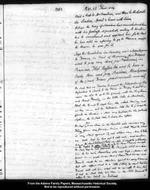
1782 NOV. 21 THURSDAY.
Paid a Visit to Mr. Brantzen, and then to the Comte de Linden; spent 2 hours with him.
He says the King of Sweeden has overwhelmed him with his Goodness, is perpetually writing to his Ministers to compliment and applaud him for the Part he has acted in refusing to go to Vienna and for the Reason he gave for it.
Says the Revolution in Sweeden, was advantageous to France, in Point of Economy, for France used to pay very dear, for Partisans, in Pensions. That Russia too, used to have a Party there and pay Pensions. Now by means of the Court, France predominates, more easily.
He said that on Tuesday he prayed the Introductor of Ambassadors to speak to the Prince de Tingry to put him upon the List to go to the Comedy, with the King, Queen and Royal Family, in the little Salle de Spectacle. That the K. and Q. eyed him the whole Evening, and as they came out the Introductor told the K. that it was the Comte de Linden, a Man very zealous for the patriotic System. The K. said Oui, Je scais son Affair.
He says that there is no Man in the Republic who receives any Thing, from any foreign Prince or State. That the Law is very strict against it, and obliges every Man to take an Oath that he has not and will not -- and no Man dares. He dont believe that the Duke ever did. It would be a blunder in the English to offer it, for he is by his Name and Family enoughattached without it.
He says, that he has followed the Principles which were given him by his Uncle, Boerslaer [Boetzelaer], who was high in favour at Court and in great Power thro the Rep [Republic]. That his Age and Family would be an Objection against his going to America, but after Affairs shall be a little settled, he expects that his Friends will ask him what will be agreable to him, but if not, he shall take his Place in the States General and retire to his Estate in Zealand.
Page 22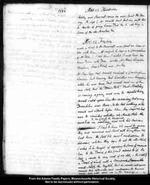
Ridley and Bancroft came in and spent the Evening. B. says that Mr. Oswald dont feel very well, that he thinks of going home. That the K. will bring in some of the old Minsters, &c.
NOV. 22 FRYDAY.
Made a Visit to Dr. Bancroft, and spent an hour or two with him. Mr. Walpole he says is a Correspondent of Mr. Fox. I told him I wished I could have two hours Time with Fox. -- Visited Mr. Mayo,Livingston, Vaughan, Rogers and Lady and Mr. Jay.
Mr. Jay says that Oswald received a Courier from London last Evening. That his Letters were brought in while he was there. That Oswald read one of them and said, that "the Tories stick." That Stratchey is coming again, and may be expected today. Oswald call'd upon him this morning, but young Franklin was there: so he said nothing, as he would not speak before him. Jay says We had now to consider, whether We should state the question in writing to the Comte de Vergennes, and ask his Answer.
I said to him We must be more dry and reserved and short with himOswald than We had been. He said We must endeavour to discover, whether they agree to all the other Points. I asked what he thought of agreeing to some Compensation to the Tories, if this Court advised to it. He said they would be very mad if We did. He said that a Tract of Land, with a Pompous Preamble, would satisfy the English. But he would call upon Oswald this Afternoon, and endeavour to know more, and call upon me in the Evening.
Page 23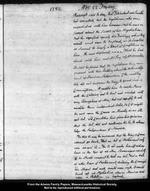
Bancroft said to day, that Fitsherbert was sensible but conceited, that the Englishmen who were acquainted with him however said he was reserved about the Secrets of his Negotiation: But he expressed openly his Feelings, when Rayneval went over to England, as it implied or seemed to imply a Want of Confidence in him. He was displeased . . . .That he had dined with him and Mr. Jay, at Mr. Oswalds. He said he found that the Englishmen here, were prepared with their Quibbles, about the Acknowledgment of American Independence. That the enabling Act did not impower the King, to grant such a Commission. It enabled him to make Peace with the Colonies, and to treat and conclude with any Discription of Men, but not expressly to acknowledge them independent States. So that it might be cast upon the Crown or Ministry as an illegal Act. Ld. Cambden had given his Opinion that the Act did not authorize the K. to acknowledge the Independence of America.
To this it may be answered that the King or Crown cannot go back. That an Act of Parliament only can annul it. The K. would make himself ridiculous in the Eyes of all Men, Souvereigns especially, if he should consent to such an Act. That a Vote of either House of Parliament, declaring the Commission illegal and null, would never pass. It would break off all Negotiations,allarm America and raise a Rebellion in England.
Page 24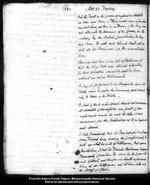
But the Truth is, the Crown of England is absolute in War and Peace. There is not even a fundamental Law, as there is, in France, that the King can not allienate the domains of the Crown. On the contrary by the British Constitution, the King has Power to cede and Alienate Parts and indeed all his Dominions, i.e. there is no Limitation.
Bancroft said there is an Act of Parliament that the King shall never alienate Gibraltar. So that Gibraltar cannot be ceded to Spain without an Act of Parliament.
B. says that Mr. Garnier is in Burgundy upon his Estate, where he passes the Summers, and comes only to Paris in the Winter.
B. said if the K. in his Speech should not announce Mr. Oswalds Commission, you Gentlemen Commissioners would do well to take some measures for the Publication of it, in England and abroad.
I said I wondered, that Mr. Fox had not sent over some Friend here, during the Conferences, to pick up what he could of Intelligence. But upon Recollection, I said his Friends, Richmond,Keppell, Townsend, Cambden &c. were in the Council and Cabinet, and therefore no doubt informed him, of all Intelligence, and let him into all the Secret of Affairs.
[This entry continues in John Adams diary 37.] 























